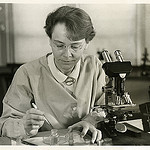Genetics in family history (Roots Tech 2014)
 My (mostly readable and occasionally incomplete) notes from the "Introduction to DNA for genealogists" RootsTech 2014 live video lecture. I've also included some helpful internet resources I found at the end of this post.
My (mostly readable and occasionally incomplete) notes from the "Introduction to DNA for genealogists" RootsTech 2014 live video lecture. I've also included some helpful internet resources I found at the end of this post.
What genealogy insights can I learn from genetic tests?
Alone, almost nothing. "DNA won't tell you, genealogy will." DNA can not replace traditional genealogical research...but it could supplement it.
Ethnicity and race
There is NO such thing as race or ethnicity at a biological level.
You can't expect accuracy in tests that trace ethnic or country origin, especially more than 5 or so generations ago. Neanderthal percentages and guesses about which country or region your ancestors came from are SUPER SPECULATIVE.
Be skeptical of the latest and greatest genetic genealogy tests, as they are still VERY experimental and often conflict between different companies (or just between one week and the next at the same company). This type of testing is more generally useful at figuring out the historical migration patterns for humanity as a whole.
I'm not sure WHY some companies seem to specialize in this, if it is so inaccurate (playing to market wants?).
Descendants of common ancestors
Currently, DNA is most useful in genealogy to connect recent relatives (within 5 past generations or so). Mostly this happens via Y-DNA tests.
For DNA to help locate people who might share a common ancestor, you need a single web site where people are sharing BOTH their DNA AND their family TREES. It's the only way to automatically narrow down potential genetic matches to a reasonable number of potential contacts. You also need a LOT of people to be sharing both their family trees and DNA in this way, which raises some serious privacy concerns! Quick tip: if don't want to be found, DO NOT SHARE your DNA or family trees anywhere online.
Overview of genetic concepts
23 pairs of chromosomes, arranged by length, (first 22 pairs are "Autosomal"; last is sex-linked X & Y; )
mtDNA (mitochondrial) = part of cell that is inherited directly from your mother, can let you trace female lineage.
Y-DNA is sex-linked. Primarily only males have this chromosome, which can generally only be passed down from father (and can help confirm direct male ancestry, since all direct male descendants have the SAME Y chromosome). However, women and men receive genetic material from both sides of their family in the 22 other chromosomes. The key number to look for when comparing the Y chromosomes of two males with the same surname, is 37 shared Y-chromosome STR markers (indicates a much higher likelihood of being related).
2 ways of Evaluating/Comparing in genetic genealogy tests
What we measure? Mistakes when DNA is copied into eggs & sperm.
- Errors are what we measure when looking at SNPs (single-nucleotide polymorphism).
- Size or Length is what we measure when looking at STRs (short tandem repeats).
Questions to ask about STRs
- How long is it?
- Do patterns in length/repetitions match with other people's (for example, does AGAT repeat 3 or 5 times?)
Questions to ask about SNPs
- Where is the mistake in the copying?
- What was omitted, left out, or "snipped"?
- What was substituted?
- When did this change occur? Because SNPs accumulate over time and are passed down, we can sometimes determine the TIME when a mistake occurred.
- Is this SNP identified in the same way by different companies? Companies may use different codes to describe haplogroups (or sets of SNPs).
Other helpful terms
centiMorgans = measurement of autosomal DNA closeness (http://www.isogg.org/wiki/
grandchildren are approximately 25% shared genetics with grandparents (all such numbers are estimates only)
MRCA = Most Recent Common Ancestor.
Comparison of companies offering genetic tests for genealogy
Key decision points for consumers:
- Can I download my raw data in a useful format?
- How Standard is that format (because different companies label SNPs differently.)
- Are there FREE tools for analyzing/comparing DNA on my computer (and not uploading it somewhere)?
Companies who offer genetic tests for genealogy
- Family Tree DNA offers 3 options: Family Finder ($), Y-DNA ($), and Full Mitochondrial Sequence ($).
- Population Finder
- Ancestry DNA (Ancestry.com)
- For Genetic Ethnicity feature, uses Sorenson samples
- 23andMe
- National Geographic Genographic Project
- Britains DNA
- myDNAmix
For more information
- http://www.legalgenealogist.
com/blog/2014/01/05/x-marks- the-spot/ - http://www.legalgenealogist.
com/blog/2014/01/26/ understanding-the-y-match/ - http://www.
thegeneticgenealogist.com/ - http://www.
yourgeneticgenealogist.com/p/ resources.html - http://www.stevemorse.org/#
genetic - http://www.isogg.org
- http://www.amazon.com/Genetic-
Genealogy-Emily-D-Aulicino/dp/ 1491840900 - http://www.dnagedcom.com/adsa/
index.php
